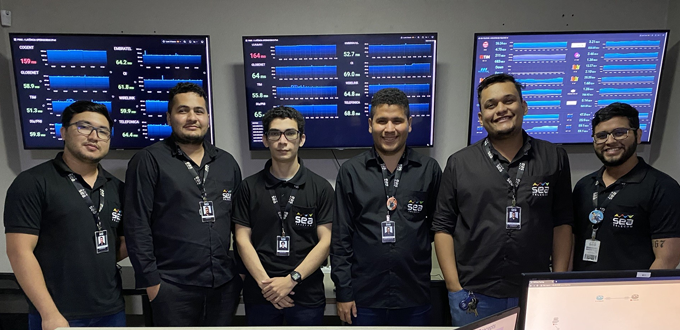Winners of the Latest Challenge: “IPv6 is Happening”
06/06/2022

Sea Telecom from Brazil was the winner of the IPv6 Challenge, an initiative created by the region’s technical community and promoted by LACNIC’s R&D department to distinguish the work of organizations that have begun to deploy IPv6 in their networks.
Erick Fernandes, Sea Telecom’s Supervisor and one of the leaders of the winning project, said that the initiative consisted of implementing IPv6 to end customers in three cities in the state of Pará (Brazil). “We monitored latency and packet loss to identify possible failures and tested services exclusively using IPv6,” said Sea Telecom’s Technician.
The project compared the two protocols (IPv4 vs. IPv6), and found few differences in latency, although they did detect greater latency benefits during the use of real-time apps. “In these cases, IPv4 suffers more frequent variations, and IPv6 tends to be more stable,” said Fernandes.
The Sea Telecom Team also conducted tests using only IPv6 and deactivating IPv4 to observe the behavior of end customers. In that sense, they detected that in large platforms, such as Netflix, the platform would work but the movies would not run. “We contacted their Technical Support and shared the information,” added Sea Telecom’s Supervisor. After the alert, Netflix identified the problem and reported the resolution to Sea Telecom’s Technical Team. As a result, movies were able to run under IPv6.
Resistance With No Explanation In relation to IPv6 deployment, Fernandes estimated that there is no real concern among organizations. At least, this is the case in northern Brazil. This is why
other experts as well insist on implementing IPv6 and integrating all services to this protocol. “I feel a very strong resistance when it comes to giving continuity to IPv6 deployment,” said Fernandes. “Most people see it as a difficulty and claim it is for the future, so they do not want to implement IPv6″.
In his opinion, people are unaware of IPv6, but it is not a matter of lack of material or courses, but rather a matter of thinking. He ruled out that costs could represent an obstacle given that all technical equipment brands that work in the market have IPv6 support.
(Free access, no subscription required)
“Now is the time to make IPv6 succeed,” stressed Fernandes, who reaffirmed that the challenge served as an incentive for them and other ISPs. The challenge ” helped to disseminate the idea that IPv6 can be fully implemented, and it can be implemented now”. He also added that the next step to be taken is to “integrate IPv6 in all our services”.